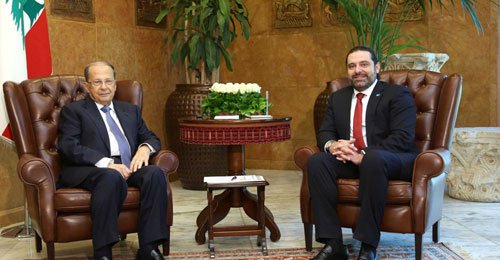 Former Lebanese PM and future Movement leader MP Saad Hariri was appointed as Lebanon’s new prime minister designate on Thursday according to President Michel Aoun’s office .
Former Lebanese PM and future Movement leader MP Saad Hariri was appointed as Lebanon’s new prime minister designate on Thursday according to President Michel Aoun’s office .
“After the necessary parliamentary consultations… the president has entrusted Saad Hariri with the formation of a government,” said a statement read by the president’s chief of staff Antoine Choucair.
The consultations kicked off on Wednesday and continued until Thursday at the presidential palace in Baabda.
The nomination comes days after Aoun was elected, with Hariri’s surprise support, ending a vacuum of more than two years.
Hariri was endorsed by 112 members of the 127-seat parliament. Only the Hezbollah movement and the Baath party , all supporters of Syria’s regime voted against him.
Speaker Nabih Berri’s Amal Movement bloc also voted for Hariri
Hariri returns to the post of prime minister five years after his last cabinet was overthrown by longtime rival Hezbollah and its allies.
After thanking outgoing PM Tammam Salam for his efforts during the past 2 years Hariri pledged to immediately start working on forming a National cabinet
Foreign aid
Lebanon’s election of a new president and the formation of a government will increase confidence in the economy and attract foreign aid, Riad Salameh said at an international conference organised by the central bank in Beirut on Thursday.
“The election of President Aoun should lead to a normal activity of the constitutional institutions … thus increasing confidence in the economy,” Salameh said
“The formation of a new government would help by attracting foreign aid and mitigating the cost of the Syrian presence in Lebanon that we estimate at 5 percent of the GDP,” he added,.
Lebanon is sheltering more than 1.5 million Syrians who have fled the civil war next door.
Political deadlock, including the presidential vacuum, paralysed state institutions and prevented the government from taking even basic decisions.
Lebanese are desperate for a better government to deal with problems in the economy, infrastructure and basic services. The stalemate came to a head last year when garbage piled up in the streets, creating a public health crisis.

Leave a Reply
You must be logged in to post a comment.